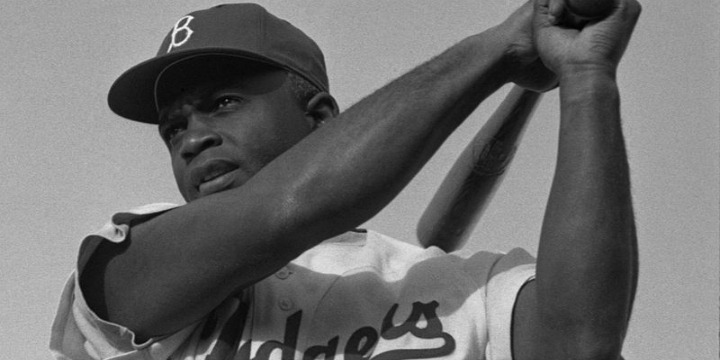Remembering Jackie Robinson
 by Harold Brackman
by Harold Brackman
Jackie Robinson was born 100 years ago. In 1947, when he broke baseball’s color barrier, Jewish slugger Hank Greenberg was almost alone among active players in befriending him. Greenberg, who took a five-year hiatus from baseball to fight the Nazis, once said: “I felt that every home run I hit was a home run against Hitler.”
In the 1940s, African-American papers acknowledged the Jews’ disproportionate support for the civil rights cause, and reciprocated with their support for Jewish victims of Hitler. The Chicago Defender condemned both Great Britain and the US State Department for their “unbelievably shameful double crossing” of Holocaust survivors whose desperate attempt to reach Palestine on the ship Hatikvah was brutally thwarted by British sailors using tear gas and fire hoses.
They also praised Jewish journalists like Walter Winchell and Shirley Povich. Famed columnist Winchell had conspicuously accompanied African-American boxing great Sugar Ray Robinson around Miami when its hotels still posted signs that read, “No Negroes, Jews, or dogs allowed.”
Jackie Robinson bore the brunt of a fierce racist backlash on and off the field. When the Philadelphia Phillies visited Brooklyn, their manager Ben Chapman ordered his players to harass Robinson with a barrage of racial insults so venomous that Jackie reportedly came close to a nervous breakdown. Chapman reportedly also hurled insults at a Jewish GI who had lost a leg.
The most dramatic display of Jewish solidarity with Jackie Robinson came from Greenberg. Probably no major league player before Robinson had been more abused by players and fans than Greenberg, who was continually taunted for being Jewish. But unlike Robinson, who was ordered by Brooklyn management not to respond to racist taunts, Greenberg warned the bigots that he would physically retaliate.
Greenberg was the first major-leaguer to enlist in the army in World War II. Unlike many other players, he volunteered for combat. Along with his four home run titles, he also won four battle stars. But the only time he really felt like a hero, Greenberg said, was the day that he sat out a key pennant race game to attend synagogue on Yom Kippur.
In May 1947, Greenberg told Robinson, “Don’t pay any attention to these guys who are trying to make it hard for you. … I hope you and I can get together for a talk.”
Many other Jews, such as Boston city councilman Isadore Muchnick, also supported Robinson — and Robinson reciprocated that Jewish support.
In 1966, when a Congress of Racial Equality (CORE) official in New York shouted at Jews, “Hitler didn’t kill enough of you,” Robinson demanded the official’s dismissal. When Black Nationalists singled out Jewish-owned stores in Harlem for picketing, Robinson denounced their “use [of] the slimy tool of anti-Semitism [and] racism.”
Unfortunately, a few years ago, the movie 42: The True Story of an American Legend played up Dodger General Manager Branch Rickey’s Methodist faith without including identifiable Jewish characters who supported Robinson. But they did — and that’s an important part of the story.
Historian Harold Brackman is coauthor with Ephraim Isaac of From Abraham to Obama: A History of Jews, Africans, African-Americans (Africa World Press, 2015).
 Iran Sentences Rapper Toomaj Salehi to Death Over 2022-23 Unrest
Iran Sentences Rapper Toomaj Salehi to Death Over 2022-23 Unrest Netanyahu: ‘Antisemitic Mobs Have Taken Over Leading U.S. Universities’
Netanyahu: ‘Antisemitic Mobs Have Taken Over Leading U.S. Universities’ U.S. Decides Against Sanctions on IDF’s Netzah Yehuda Battalion
U.S. Decides Against Sanctions on IDF’s Netzah Yehuda Battalion Israel Says It Is Poised to Move on Rafah
Israel Says It Is Poised to Move on Rafah Israeli Hostage Hersh Goldberg-Polin Seen Alive in a New Hamas Video
Israeli Hostage Hersh Goldberg-Polin Seen Alive in a New Hamas Video Palestinian Prime Minister Announces New Reform Package
Palestinian Prime Minister Announces New Reform Package France: Man Suspected of Abducting, Raping Jewish Woman ‘to Avenge Palestine’
France: Man Suspected of Abducting, Raping Jewish Woman ‘to Avenge Palestine’ Israel Intensifies Strikes Across Gaza, Orders New Evacuations in North
Israel Intensifies Strikes Across Gaza, Orders New Evacuations in North Iran Threatens to Annihilate Israel Should It Launch a Major Attack
Iran Threatens to Annihilate Israel Should It Launch a Major Attack ‘Completely Baseless’: Reports of Mass Graves at Gaza Hospitals are False, IDF Says
‘Completely Baseless’: Reports of Mass Graves at Gaza Hospitals are False, IDF Says




 Netanyahu: ‘Antisemitic Mobs Have Taken Over Leading U.S. Universities’
Netanyahu: ‘Antisemitic Mobs Have Taken Over Leading U.S. Universities’ Iran Sentences Rapper Toomaj Salehi to Death Over 2022-23 Unrest
Iran Sentences Rapper Toomaj Salehi to Death Over 2022-23 Unrest Israeli Hostage Hersh Goldberg-Polin Seen Alive in a New Hamas Video
Israeli Hostage Hersh Goldberg-Polin Seen Alive in a New Hamas Video Israel Says It Is Poised to Move on Rafah
Israel Says It Is Poised to Move on Rafah U.S. Decides Against Sanctions on IDF’s Netzah Yehuda Battalion
U.S. Decides Against Sanctions on IDF’s Netzah Yehuda Battalion